Recent events of racial injustice have heightened awareness about our nation’s history of systemic racism. This evolving understanding has fueled an overdue commitment to address modern structures and personal biases that perpetuate oppression toward people of color and marginalized communities. In response, administrative and nursing leaders in an urban healthcare facility designed Unity Rounds (UR), a multidisciplinary forum to promote awareness and create sustainable change through educational offerings and guided discussion related to health equity and racial justice. UR is a grassroots initiative developed for members of the Hematology / Oncology / Hematopoietic Stem Cell program, with the intent of serving alongside larger-scale efforts to promote health equity and address underlying issues of structural racism and implicit biases in the healthcare landscape. This article describes the development, implementation, and program evaluation of the initial offering of Unity Rounds.
Key Words: diversity, racism, social injustice, health equity, nursing, inclusion, workforce, education, interdisciplinary
Tragic killings of Black and Brown individuals in the United States (US) in 2020 garnered public attention, sharpening awareness of inequities by race and ethnicity. (Bailey, et al, 2020; Lingras et al, 2021). Subsequently, these events have prompted the healthcare community to acknowledge deficiencies in hiring and retaining diverse staff and serving patients with culturally and racially sensitive and equitable healthcare (Lingras et al, 2021). Historically, the Hematology / Oncology / Hematopoietic Stem Cell Transplant (HOH) program at a freestanding, pediatric hospital has lacked a formal channel to discuss racism and health equity. In response to this gap, Unity Rounds (UR) was created as a grassroots, local, forum for healthcare professionals to grow and learn through educational offerings and open dialogue. This article describes the development, implementation, and program evaluation of the initial offering of Unity Rounds.
Unity Rounds (UR) was created as a grassroots, local, forum for healthcare professionals to grow and learn through educational offerings and open dialogue
The mission of UR is to foster an inclusive environment and sustainable commitment to health equity and social justice work as a department. Offered as a quarterly forum, UR serves as a safe and confidential space open to all multidisciplinary clinicians and support staff within the HOH program. UR is intended to align with other larger-scale initiatives offered within the institution to address the mutual goal of promoting equity, diversity, and inclusion.
The mission of UR is to foster an inclusive environment and sustainable commitment to health equity and social justice work as a department.
People of color in the United States experience worse health outcomes than their white counterparts. (Effland et al, 2020; Lingras et al, 2021). Conscious and unconscious racism, as well as structural racism, contribute to these health inequities. Racism can be defined as “one dominant group who is conferred relative power and privilege to out systemic oppression through institutional practices and policies, which support the shaping of cultural beliefs and values” (Effland et al., 2020, p. 152). Implicit bias, or unconscious attitudes and judgements toward others, and structural racism, the policies and systems oppressing people of color, are factors that perpetuate the disparity in healthcare quality and outcomes between white and non white individuals. History has demonstrated that structural racism, implicit bias, and discrimination are present within academic medicine environments throughout the recruitment process, retention efforts, and professional development processes (Sotto-Santiago et al., 2020). To change the status quo within academic medicine, opportunities for dialogue and education for healthcare providers must exist within the healthcare community.
opportunities for dialogue and education for healthcare providers must exist within the healthcare community.
The significance of incorporating health equity work into education for health professionals is well documented in the literature. The work of Perdomo et al (2019) reflecting on conferences entitled “Health Equity Rounds” highlighted the significance of including faculty of all training levels in discussion about issues related to implicit bias and structural racism. Further, Effland et al (2020) cited the importance of education around health equity and the necessity of modifying hiring practices to cultivate a workforce that more closely reflects the population for which it cares. A model to address issues of diversity and equity from a departmental level within larger healthcare institutions is described by Lingras et al. (2021). Finally, review of the literature emphasized the importance of a safe space for consideration of sensitive content (Acosta &Ackerman-Barger, 2017; Davis & O’Brien, 2020).
Unity Rounds
Pre UR Forum: Development and Survey
In summer 2020, administrative and nurse leaders from our HOH program met to share ideas and mutual goals for implementation of UR. Our intention was to create a departmental level forum to reach a wide scope of multidisciplinary staff within the HOH program. Staff included nurses, nurse practitioners, clinical assistants, and patient experience representatives; employees from departments of social work, chaplaincy, and environmental services; nurse scientist; medical providers; hospital administrative leadership; and members of the Equity, Diversity, and Inclusion (EDI) Council.
Initially, three leaders from the HOH program (Authors) from various ethnic backgrounds and professional disciplines attended a hospital-sponsored Bystander to Upstander workshop, read literature about racism and health disparities, and engaged in self-reflection and group conversation to prepare themselves to lead this initiative. Council leaders next developed a charter to outline the group mission, vision, background, and objectives (Figure 1).
Figure 1. 6th Floor Unity Rounds Charter
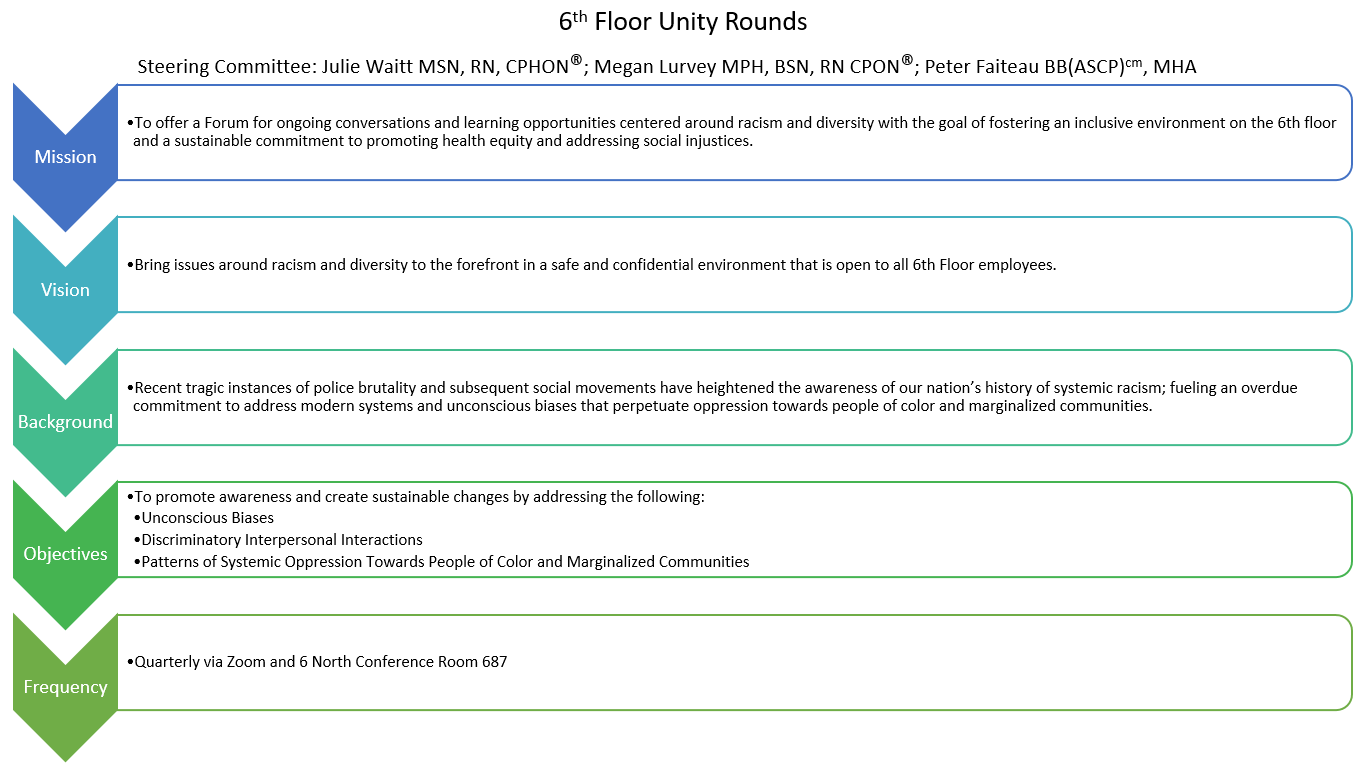
A nurse scientist was consulted to guide quality measures and develop pre-and post-survey questions.
Approval to move forward with UR was obtained from the Office of Equity and Inclusion. Hospital leaders involved in equity, inclusion, and diversity work were identified to serve as mentors through the process as the three initial leaders lacked formal training in leading discussions centered on sensitive topics, such as systemic racism and implicit biases. A nurse scientist was consulted to guide quality measures and develop pre-and post-survey questions. Before the first forum, a survey was sent to all HOH staff to gauge interest and prioritize topics for discussion. Survey questions included:
- Are you interested in participating in an open forum on the 6th floor to discuss and learn more about issues surrounding diversity, racism, and social justice?
- Select up to 3 topics of interest to you: Unconscious Bias, Privilege, Macroaggressions, Intersectionality, Health Equity, Being Anti-Racist.
- How would you like to see these topics facilitated? Guided discussion, media clips, guest speakers, journal articles, self-assessment?
- What is your comfort level addressing these topics?
- What do you hope to see change as a result of this forum?
Figure 2 presents results from the pre-UR survey.
Figure 2. Pre-Survey Results
1. Are you interested in participating in an open forum on the 6th floor to discuss and learn more about issues surrounding diversity, racism, and social justice?
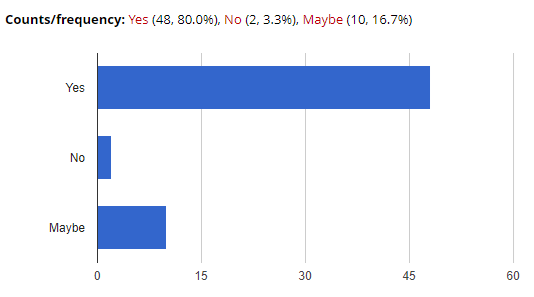
2. Select up to 3 topics of interest to you:
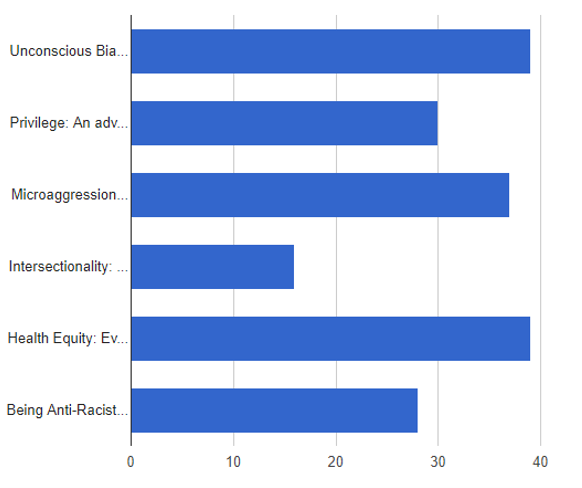
3. How would you like these topics facilitated?
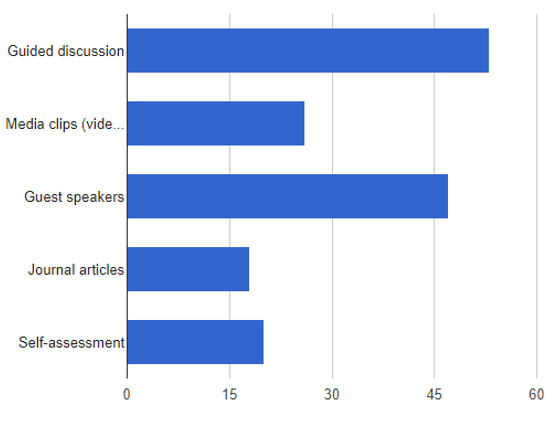
With this preliminary information, the co-chairs of UR met weekly to produce content for each session. UR forums are held quarterly for one hour on Fridays via a virtual platform and are led by UR co-chairs and faculty from within the HOH program. All staff from the HOH program receive email invitations and reminders to attend. Staff joined virtual sessions during work hours or voluntarily attended on their own time. All attendance was voluntary and was tracked.
Staff joined virtual sessions during work hours or voluntarily attended on their own time.
Implementation: Unity Rounds Content and Timeline
Session 1. Structural Racism and Voting Rights. The inception of UR was intentionally held in October 2020 to coincide with the upcoming United States presidential election. This forum, led by the UR co-chairs and mentors, included a didactic presentation comprised of statistics, media clips, and guided discussion. Senior hospital leadership, the Chief Executive Officer and Chief Operating officer of BCH, attended the kick-off event to highlight how the program aligns with the overall institutional mission to promote equity, diversity, and inclusivity.
Session 2: America's Original Sin: Slavery, Reconstruction, Dr. MLK, Jr., and Present Day. The second session took place in January 2021. Co-chairs chose this topic to serve as a foundation for future topics. The session examined events, policies, and contributors that have impacted the livelihood of Black and Brown people throughout the 400-year history in the United States. Facilitators utilized audio and visual presentation, media clips, and guided discussion. Acknowledging history, particularly in academic medicine, was imperative to provide context to support informed decisions regarding patients from diverse backgrounds. With this historical basis in place, we chose future topics that pertain to the health equity of populations served by the HOH program.
Facilitators utilized audio and visual presentation, media clips, and guided discussion.
Session 3: Sickle Cell Disease: Why Words, Attitudes, and Actions Matter. This session was held in April 2021 and led by HOH affiliated, Harvard affiliated Senior Physicians and Associate Physicians of Global Health. Major themes from the forum included language to discuss patients with sickle cell disease as well as drawing attention to biases that are present in clinical care, such as inequitable pain assessment and management.
Session 4: Neighborhood Poverty and Pediatric Allogeneic Hematopoietic Cell Transplantation Outcomes: A Center for International Blood and Marrow Transplant Research (CIBMTR) Analysis. The fourth session, in July 2021, featured a Harvard affiliated pediatric oncologist who presented her research on poverty and social disparities for children with cancer treated in clinical trials in the United States.
Major themes from the forum included language to discuss patients with sickle cell disease
Session 5: A Literature Review of Racial Disparities in Overall Survival of Black Children With Acute Lymphoblastic Leukemia Compared With White Children With Acute Lymphoblastic Leukemia. The final session in October 2021 considered reflection from a postdoctoral research fellow about the relationship between concrete material hardship, parental distress, and quality of life in children with cancer.
Post UR Forum: Survey
Following each forum, post-surveys were sent to the multidisciplinary staff who participated to obtain feedback about lessons learned and garner suggestions for future offerings. Data were captured through a secure web-based, data capture platform. Survey results were exported and analyzed by the co-chairs using descriptive statistics and content analysis of narrative responses. Post-UR survey questions included the following:
- Did you find Unity Rounds to be a positive learning experience?
- Would you recommend Unity Rounds to a co-worker?
- How willing are you to participate in Unity Rounds again?
- What did you learn in this session?
- What suggestions do you have for future sessions?
Results
Pre-survey results had indicated an overwhelmingly positive response from the HOH staff noting their interest to participate in UR sessions. Of the 60 HOH staff who took the pre-survey, only two individuals expressed no interest in attending this type of forum.
Participation by senior leaders in the kick-off event demonstrated top-down buy-in and support for programs at the local, departmental level.
Five Unity Rounds sessions (as described above) have been held to date. Participation by senior leaders in the kick-off event demonstrated top-down buy-in and support for programs at the local, departmental level. The average attendance for the initial five sessions was 24 multidisciplinary staff members. Participants represented various disciplines, primarily nursing (average 61%), leadership (average 8%), and administrative staff (average 8%). Figure 3 illustrates attendance by discipline.
Figure 3. Unity Rounds Attendance
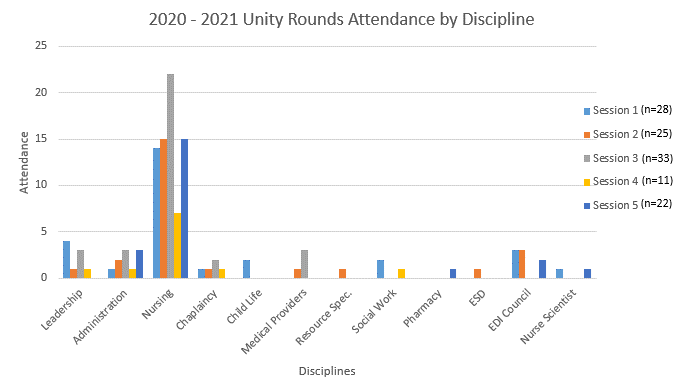
An average of 96% of attendees reported interest in attending upcoming sessions.
Post UR surveys were completed by 119 participants, for a response rate of 41%. An average of 96% of attendees reported interest in attending upcoming sessions. In addition to intent to participate again, responses included narrative reflections about knowledge learned in each session, likelihood to recommend sessions to coworkers, and their desires for future discussions. Of the five post survey responses, all feedback was positive with the exception of one negative comment in the second session regarding the format of the virtual UR forum. One participant noted “I didn't like the vote/multiple choice format. Maybe something that fosters interaction like the chat function.” Figure 4 includes selected quotes that demonstrate responses to the question, “What did you learn?” for each session.
Figure 4. Select Post-Survey Reflections by Attendees
|
Session 1. Structural Racism & Voting Rights |
|
|
Session 2. America's Original Sin |
|
|
Session 3. Sickle Cell Disease |
|
|
Session 4. Neighborhood Poverty and Pediatric Outcomes |
|
|
Session 5. Racial Disparities in Overall Survival of Black versus White Children With Acute Lymphoblastic Leukemia |
|
Discussion
UR is a grassroots and homegrown departmental level initiative.
UR is a grassroots and homegrown departmental level initiative. The curriculum selected for UR was informed by staff input from the pre-UR survey and influenced by educational needs deduced by the co-chairs’ experiences within the HOH program. The first two sessions served as a foundation for future forums by offering historical context and reflection about ongoing national issues centered on disparity, inclusivity, and the state of affairs for people of color. The following three sessions focused on HOH research that highlighted health equity of patient populations served within the program. Themes were central to the health disparities amongst pediatric patients with sickle cell disease, cancer diagnoses, and patients who underwent stem cell transplants. Based on post-UR survey responses, future sessions will discuss incarceration and police reform; implicit bias; and micro-aggressions. The overarching goal was and is to bring awareness of how these particular topics impact health equity.
The UR co-chairs were pleased to achieve their initial vision of offering a safe and confidential environment, open to all multidisciplinary clinical and support staff within the HOH program, to discuss complex and sensitive issues. Of the multiple disciplines represented by those who attended, nursing had the highest number of attendees (Figure 3). The blend of professionals from various work settings fostered inclusivity and connection.
The overarching goal was and is to bring awareness of how these particular topics impact health equity.
Our initial implementation of UR had some limitations. Despite efforts to promote UR via email, staff meetings, flyers, and word-of-mouth conversation, the average participant count of each session was 24 staff members. Barriers to participation in UR may have included time constraints, distraction, and burnout related to the COVID-19 pandemic. The virtual format can be limiting for those who do not have a computer and online access and may impede the natural flow of conversation inherent to in-person learning and discussion.
Of the multiple disciplines represented by those who attended, nursing had the highest number of attendees
UR co-chairs share a mutual commitment to social justice, and our mission has been to offer an opportunity to bring awareness to the historical, social, economic, and individual factors that influence health outcomes and the treatment of people of color. Our principles align with the conclusions of Acosta and Ackerman-Barger (2017), who argued that these conversations must take place in safe spaces where participants can be honest and vulnerable. Due to the sensitive and uncomfortable nature of discussing topics centered on racism, it is common for individuals to avoid these difficult conversations (Davis & O’Brien, 2020).
By fostering a safe, respectful, inclusive environment, the goal of UR has been for staff to learn from the speakers and from the lived experiences of others in attendance through what is shared during session discussions. Our hope is that participants will reflect on their own biases, and approach patient care and interactions with co-workers with a greater sense of equity and inclusivity.
Conclusion
Increased social awareness of the violence against Black and Brown people has instigated an awakening amongst members of the medical community to invest in education, engage in conversation, and implement action in order to address long-overdue personal and systemic barriers to equitable healthcare. (Lingras et al, 2021). Acosta and Ackerman-Barger (2017) argued that conversations around cultural sensitivity and unconscious bias are inadequate. In order to transform the work of healthcare professionals to combat racism, offerings from formal curriculum to workplace discussion must incorporate an "antiracist framework and the pedagogy of discomfort" (p. 287).
We must provide tools for speaking up against prejudice.
We must provide tools for speaking up against prejudice. UR serves as a template for other departments and institutions whereby motivated, multidisciplinary staff can join to impact change on a local level under the guidance of established mentors and with the support from top-down institutional leadership. UR alone is not a direct remedy to address underlying issues of structural racism and implicit biases in the healthcare landscape. Accordingly, the goal of the UR is to serve alongside and in alignment with other grassroots and larger-scale efforts within the institution. These efforts have potential to impact hiring practices to promote a more diversified workforce; provide concrete tools and training to speak up against racism; and better appreciate patient and family needs to deliver optimum healthcare to all.
Authors
Peter Faiteau, MHA, BB (ASCP)CM
Email: Peter.Faiteau@childrens.harvard.edu
ORCID ID: 0000-0003-0693-1511
Peter Faiteau is the Patient Services Administrator for the inpatient Hematology/Oncology/Hematopoietic Stem Cell Transplant program at Boston Children’s Hospital since 2018. He obtained a Bachelor’s in Medical Laboratory Science at Northeastern University in 2009 and Master’s in Healthcare Administration at Suffolk University in 2014. He has been in healthcare management since January 2015. Through his leadership and mentorship, he has a passion to help others and make a difference within the program. This includes addressing workplace diversity and structural racism. He received the 2021 Boston Children’s Hospital Diversity Champion Award for his efforts to address racism, workplace diversity and inclusivity.
Megan Lurvey, MPH, RN, CPON®
Email: Megan.Lurvey@childrens.harvard.edu
ORCID ID: 0000-0003-0209-0209
Megan Lurvey is a Clinical Coordinator on the Inpatient Hematology/Oncology/Clinical Research Unit at Boston Children’s Hospital since 2020. Prior to this role, she worked as a nurse on the Inpatient Hematopoietic Stem Cell Transplant Unit for 13 years. Megan is interested in improving pediatric oncology care and treatment outcomes worldwide and reducing healthcare disparities at local and global levels. Her passion for global health led her to obtain a Master’s Degree in Public Health from University of Massachusetts and to partake in initiatives in the Dominican Republic, Mexico, and Myanmar. Megan has co-authored a previous article related to disparities in the delivery of pediatric oncology nursing care by country income level.
Julie Waitt, MSN, RN, CPHON®
Email: Julie.Waitt@childrens.harvard.edu
ORCID ID: 0000-0002-1668-3390
Julie has worked on the Hematopoietic Stem Cell Transplant Unit at Boston Children's Hospital since 2006 where she has evolved in her role as a clinical assistant to become a preceptor, charge nurse, Nurse Manager and now the Nurse Director. Julie’s dedication as a nurse leader led her to pursue a Master’s Degree in Nursing Leadership and Management at Western Governors University. Her particular passion in nursing leadership is to foster staff development and improve patient quality outcomes. Julie shows a commitment to equity, diversity and inclusivity by demonstrating an intention to recruit and retain a diverse workforce that resembles the patient population in which it serves.
References
Acosta, D., & Ackerman-Barger, K. (2017). Breaking the Silence: Time to Talk About Race and Racism. Academic Medicine, 92(3):285-288. https://doi.org/10.1097/ACM.0000000000001416
Bailey, J.M., Baker, M., Barker, K., Bogel-Burroughs, N., Cohn, N., Diaz, J., Edmonson, C., Fandos, N., Fuller, T., Grillo, E., Jakes, L., McCann, E., Mazzei, P., Mervosh, S., Montgomery, D., Overbye, D., Pérez-Peña, R., Quealy, K., Robles, F., Schweber, N., Shanahan, E., Singer, N., Sperling, N., Tully, T., Victor, D., & Weise, K. (2020, June 10). America’s Reckoning on Racism Spreads Beyond Policing. The New York Times. https://www.nytimes.com/2020/06/10/us/protests-black-lives-matter-george-floyd.html?smid=em-share
Davis, S., & O’Brien, A. (2020). Let’s Talk About Racism: Strategies for Building Structural Competency in Nursing. Academic Medicine, 95(12):S58-S65. https://doi.org/10.1097/ACM.0000000000003688
Effland, K.J., Hays, K., Ortiz, F.M., & Blanco, B.A. (2020). Incorporating an Equity Agenda into Health Professions Education and Training to Build a More Representative Workforce. Journal of Midwifery & Women’s Health, 65:149-159. https://doi.org/10.1111/jmwh.13070
Lingras, K.A., Alexander, M.E., & Vrieze, D.M. (2021). Diversity, Equity and Inclusion Efforts at a Departmental Level: Building a Committee as a Vehicle for Advancing Progress. Journal of Clinical Psychology in Medical Settings, 1-24. https://doi.org/10.1007/s10880-021-09809-w
Perdomo, J., Tolliver, D., Hsu, H., He, Y., Nash, K.A., Donatelli, S., Mateo, C., Akagbosu, C., Alizadeh, F., Power-Hays, A., Rainer, T., Zheng, D.J., Kistin, C.J., Vinci, R.J., & Michelson, C.D. (2019). Health Equity Rounds: An Interdisciplinary Case Conference to Address Implicit Bias and Structural Racism for Faculty and Trainees. MedEdPortal: The AAMC Journal of Teaching and Learning Resources, 15:10858. https://doi.org/10.15766/mep_2374-8265.10858
Sotto-Santiago, S., Mac, J., Duncan, F., & Smith, J. (2020) "I Didn't Know What to Say": Responding to Racism, Discrimination, and Microaggressions with the OWTFD. MedEdPortal: The AAMC Journals of Teaching and Learning Resources, 16:10971. https://doi.org/10.15766/mep_2374-8265.10971


